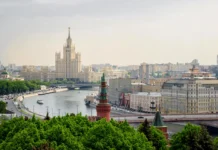Speakers Advocate for Collaboration and Solidarity to Drive Sustainable Development as Economic and Social Council Launches Coordination Segment
The Economic and Social Council (ECOSOC) opened its 2025 Coordination Segment today, with speakers emphasizing the need for a collaborative approach and renewed solidarity to achieve sustainable development. The two-day event, featuring panel discussions and interactive dialogues, centers on the theme of “Advancing sustainable, inclusive, science- and evidence-based solutions for the 2030 Agenda and its Sustainable Development Goals (SDGs) to ensure no one is left behind.”
Bob Rae, President of the 54-member Council, underscored the universal relevance of the SDGs, describing them as the “common sense of humanity.” He highlighted successful partnerships, such as the Spotlight Initiative, which has safeguarded over 21 million girls and women from gender-based violence; the Global Ghost Gear Initiative, addressing marine pollution through collaboration with 130 stakeholders; and the Infrastructure for Resilient Island States initiative, aimed at bolstering climate and disaster resilience.
Reflecting on the UN’s founding vision, Rae noted that its creators sought to address not only political challenges but also economic and social issues. He emphasized that commitment to multilateralism, exemplified by the UN’s $75 billion budget in 2024, enhances rather than diminishes national sovereignty.
Guy Ryder, UN Under-Secretary-General for Policy, warned of the high stakes, pointing out that only 17% of the SDGs are on track, with many critical targets regressing. He cited escalating conflicts, widening inequalities, the worsening climate crisis, and the disruptive impact of unregulated technology as pressing challenges. Ryder called for unlocking the necessary financing, alleviating debt burdens, and protecting economies from external shocks. He highlighted the Pact for the Future as a roadmap for reform, stressing the need to overhaul the international financial architecture to achieve the SDGs.
Anatolio Ndong Mba, ECOSOC Vice-President, echoed these concerns, stating that progress on the SDGs has stalled or reversed in many areas. He urged the international community to bridge divides, mobilize resources, and implement transformative solutions. Mba emphasized the Council’s role in leveraging insights from its subsidiary bodies to drive progress.
Conversation with Regional Commissions and Expert Bodies
Following opening remarks, the Council engaged in a dialogue with the Executive Secretaries of regional commissions and chairs of functional commissions and expert bodies. The discussion focused on accelerating the implementation of the 2030 Agenda and leveraging outcomes from the Summit of the Future.
Panel Discussion: Transformative Solutions for Sustainability and Inclusion
The first panel, moderated by Navid Hanif, UN Assistant Secretary-General for Economic Development, explored transformative solutions to foster sustainability and build an inclusive future.
Ligia Noronha, Head of the UN Environment Programme’s New York Office, highlighted the trade-offs in clean energy transitions, particularly the environmental and social impacts of mining for critical minerals. She stressed the need for equitable partnerships with local communities to address these challenges.
Maximo Torero, FAO Chief Economist, cautioned against increasing food productivity without considering biodiversity or carbon emissions. He emphasized the importance of financing to integrate agrifood systems into a just transition and called for a “blue transformation” to balance food security and biodiversity protection.
Hindou Oumarou Ibrahim, an expert in Indigenous knowledge and climate adaptation, underscored the value of traditional ecological knowledge. She noted that less than 1% of climate and biodiversity funding reaches Indigenous communities, despite their proven ability to live in harmony with nature.
Achim Steiner, UNDP Administrator, advocated for more holistic development metrics, combining the human development index with a planetary health index. He emphasized the importance of integrating Indigenous knowledge with modern technology.
Eduard Matoko, UNESCO Assistant Director-General, highlighted the role of culture and heritage in development, urging a balance between traditional knowledge and modern practices. He called for a shift in mindset alongside increased funding.
Pablo Fernández Marmissolle-Daguerre, Assistant Secretary-General for Partnerships at United Cities and Local Governments, emphasized the role of coastal cities in driving transformative solutions. He advocated for recognizing local governments as key actors in ocean conservation and integrating cultural rights into the post-2030 agenda.
Panel Discussion: Investing in Healthy, Inclusive, and Resilient Societies
The second panel, moderated by Krzysztof Szczerski, ECOSOC Vice-President, focused on building healthy, inclusive, and resilient societies.
Catharina Lasseur, Chair of the Commission on Population and Development, emphasized the need for universal healthcare to address demographic shifts, including ageing populations and migrant communities. She called for inclusive policies to ensure equal opportunities for women.
Werner Obermeyer, WHO Director, highlighted the pandemic’s devastating impact on global health progress, stressing the need for better financing and a focus on primary healthcare to achieve universal health coverage.
Ilze Brands Kehris, UN Assistant Secretary-General for Human Rights, argued that investments guided by human rights yield the best societal returns. She called for reforming the international financial architecture to ensure equitable development.
Ana María Oviedo, World Bank Lead Economist, warned of stalled progress in poverty reduction, noting that nearly half the global population lives on less than $6.85 a day. She emphasized the need to address barriers faced by women and marginalized groups.
Ophelia Kemigisha, Programme Officer at Outright International, highlighted the challenges faced by LGBTI+ communities, asserting that a society denying their rights cannot be resilient. She called for inclusive policies to ensure their full participation in development.
The discussions underscored the urgency of collective action, innovative solutions, and inclusive policies to achieve the SDGs and build a sustainable future for all.





